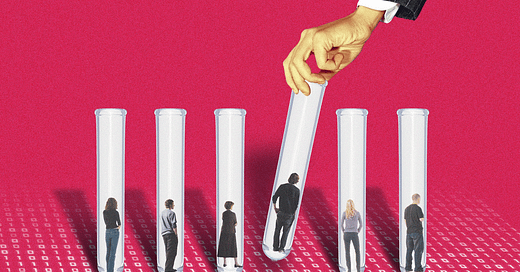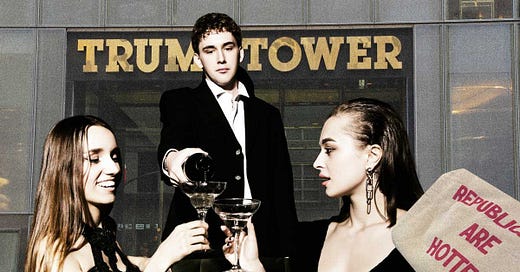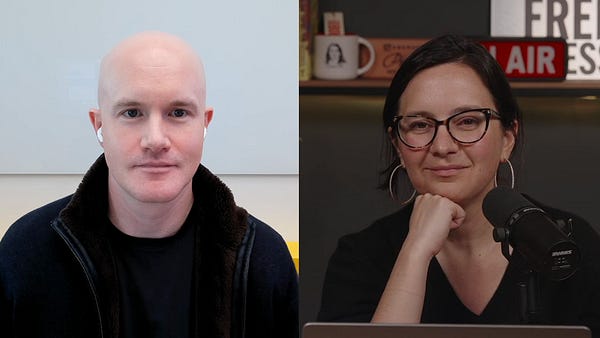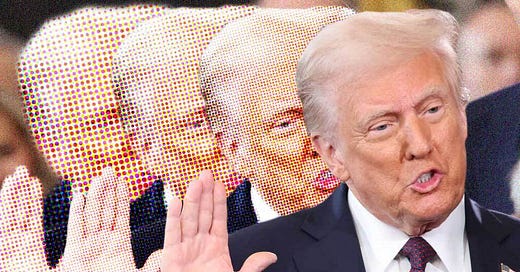
The Free Press

To understand this week’s biggest business story, please join me in remembering the solipsistic, race-crazed fever dream that was American culture in 2017.
This was the year when young adult fiction writers ate each other alive over a fantasy novel that was allegedly racist toward fairies. In Portland, Oregon, a food truck was shuttered and its owners threatened with violence because they had supposedly culturally appropriated indigenous burrito recipes. In New York, fashion designer Marc Jacobs had just been similarly canceled for putting white models in dreadlocks. The art world was earnestly debating whether the Whitney Museum of American Art should remove a white artist’s painting of Emmett Till from view—or, alternatively, whether they should remove it and then set it on fire.
All these incidents (and these are only a handful) represented the rise of a far-left ideology that was utterly fixated on racial and ethnic identities, which were in turn seen as proxies for power, privilege, and general moral standing. The more intersectional you could claim to be, the more sympathy you deserved. The more privileged, the more you should sit down, shut up, and stop taking up space—particularly when people who looked like you had already taken so much.
And then, just in time for the holiday season, Americans discovered the perfect product for our identity-obsessed times: the bespoke genetic analysis offered by the company 23andMe, which broke out big in 2017 after Oprah put it on her annual list of “favorite things.”
It was, she said, “the ultimate selfie.”
Founded in 2006, 23andMe piggybacked on the groundbreaking advances of the Human Genome Project to offer direct-to-consumer personal DNA sequencing. The service made an audacious promise: Swab a few cells from your cheek, and the company would send you back a complete genetic profile, analyzing your ethnic makeup down to a tenth of a percent. Implicit in the sales pitch was that this information was deeply meaningful—that you could have your entire sense of self transformed by the revelation that you were 20 percent Armenian, or 1.4 percent Bangladeshi, or even part Viking, all for the low, low price of $99.
The Oprah endorsement, perfectly positioned to appeal to a populace increasingly consumed by identitarianism, sparked a brief but explosive period of growth. By 2019, 23andMe had 10 million users, 80 percent of them American; in 2021, the company debuted publicly with a valuation of $3.5 billion based on market enthusiasm alone. (It soon climbed to $6 billion.)
But a mere four years later, earlier this week, 23andMe filed for bankruptcy in a Missouri court. Today, it is being treated by the business media as a cautionary tale about the dangers of one-trick-ponyism: The company never diversified its consumer offerings beyond the initial cheek swab. It is also an example of the security hazards of amassing a huge quantity of sensitive biometric data that you will then be expected to protect: The downfall of 23andMe can be traced in part to a massive, scandalous data leak on October 7, 2023—it targeted Ashkenazi Jews—which exposed the personal information of nearly half its 14 million customers.
Now, the bankruptcy filing is prompting alarming questions about what will happen to all that genetic data. California attorney general Rob Bonta warned customers that they should get in touch with 23andMe to demand the deletion of their data. And Monday night, the company’s website briefly went down because it was experiencing a “high volume of inquiries and increased web traffic.”
Many headlines have ensued, but what commentators seem to be missing is this: The disintegration of 23andMe represents a cultural collapse as well as a financial one. This is the tale of a zeitgeist fueled by both the self-loathing of white liberals and a reflexive anti-Americanism throughout the mainstream—phenomena that the current vibe shift has upended like Tupperware over a trash can, its vestiges sliding off like so many moldy leftovers into the abyss where fads go to die.
Back in 2017, with victimhood associated with blackness, brownness, or another minority racial status, white people were conversely assigned the role of society’s Bad Guys. Reactions varied: Certain white Americans leaped at the opportunity to confess, repent, and pay through the nose to self-flagellate at events like the infamous “Race2Dinner” parties where, for several thousand dollars, a real, live person of color would come to your home and call you a racist.
For those of lesser means but similar dispositions, 23andMe offered another path to redemption, by promising to find “surprises” in one’s ethnic makeup. As one white man, who discovered he had “Hidden African DNA,” wrote reassuringly in the 23andMe blog: “Our histories are not as black and white as we believe.”
This is not to say that every person who submitted a cheek swab for analysis was marinating in racial self-hatred; plenty of people were simply curious, hoping to uncover a bit of family history (or, for those who bought the 23andMe+ Total Health package, their risk factors for various genetic conditions). But if you were struggling with white guilt, 23andMe could apply the gloss of scientific rigor to your search for a get-out-of-oppressor-status-free card—a state of affairs that was lampooned in a 2017 episode of South Park, in which customers of a company called “DNA and Me” received their test results and gleefully announced themselves as members of oppressed groups (“I’m 21 percent victim!”).
Some, of course, took this impulse further: College application forums began to fill with messages from students who felt emboldened by DNA test results to inquire just what percent Native American a person may need to be to qualify for scholarships. Rumors began to circulate about the insane behavior of white women who had recently discovered that they were Jamaican or Ethiopian or Tunisian at the molecular level—and decided to embrace that identity. And sure enough, in 2021, the same year that 23andMe made its splashy, multibillion-dollar public debut, one study found that people who had undergone a genetic ancestry test were more likely to self-identify as multiracial afterward. Meanwhile, that same year, a separate study found that fully one-third of white students were lying about their race on their college applications.
If all this was a bit absurd, it was also understandable given the excesses of the moment and the seemingly boundless energy of its enforcers. This was the era in which Lionel Shriver caused a meltdown in the publishing world for defending the right of novelists to write characters who didn’t share their identity markers—and in which one of the nation’s most popular podcasts featured a grown woman breaking down in tears because 10 years prior, a food magazine assigned a white writer to do a story about soup dumplings. At a moment when you could suffer the total ruination of your personal and professional life for something as benign as making burritos while white, of course people began grasping at straws—or DNA strands—that held the promise of being something, anything, else. The yearning was ubiquitous enough that it even seeped into the world of children’s entertainment: In 2019, the sequel to Disney’s Frozen introduced a key side plot in which Elsa, the Scandinavian ice queen, discovers that she’s actually half-indigenous.
This was all well and good for Elsa. But the promise of wishing away one’s white liberal guilt using the blood magic of DNA testing proved illusory for the non-Disney princesses among us. Indeed, the most significant impact of the 23andMe boom—apart from the apprehension of various criminals and some awkward revelations of the “you’re not my real father” variety—is that it only made people double down on the idea that a marginalized identity is something precious and not easily acquired, and certainly something to be jealously guarded from unworthy pretenders. The phrase white privilege was easily replaced by white-passing privilege, the argument being that power comes from appearing white, regardless of whether an individual is actually 5 percent Indian.
But this mindset is itself on the way out. And as we emerge from the identitarian fugue of the past decade or so, it’s funny to realize how much the individual yearning to find one’s identity through genealogy really only revealed a deeper, collective truth about what it means to be American.
Because hasn’t the American experiment—and the American dream—always been founded on the notion that it doesn’t matter where you came from, or from whom, that you can come to this country to escape these things, or even forget them entirely? We are a nation of people whose ancestors were drawn explicitly by this promise: that to be American was to unbind yourself from history, from ancestry, because here, you had the freedom to be anyone you wanted.
For the past decade or so, for a certain type of person, that freedom has been positioned as a source of shame. This person thinks that to identify as American is gauche and unworldly; he finds the American flag vaguely embarrassing, perhaps even racist; he seeks comfort in hyphenated modifiers that mark him as other-American, an outsider on the inside. This person will tell you that America has no culture—or that if it does, it’s only a trashy, hollow aggregate of good things we stole from better people than us, and passed through the twin meat grinders of oppression and colonization to yield a dollar-store, fast-food, NASCAR-flavored slop.
And for the past decade or so, this person was more or less in charge of telling other Americans how to feel about America, which is to say: bad.
But in the wake of an election which, in addition to anointing a new president, is also understood by most to be a widespread repudiation of that worldview, that person, along with the rest of the country, must come to terms with the truth: that Donald Trump’s “America First” agenda appealed to many people, including many immigrants, at least in part because they see themselves first as Americans. That “American,” for better or worse, is an identity we all share. And that beyond the novelty of discovering you were one eleventyseventh Tunisian, 23andMe offered no meaningful information to anyone on the topic of identity—which is about so much more than the arrangement of your genes.
In this country, you are what you love, what you create, what you believe, and what you become; you are how you move through the world, how you treat the people in it. And yes, 23andMe could tell you where your parents’ parents’ parents came from; it might even reveal which of your relatives were adulterers or murderers. But it could never tell you who you are.
If this article, or any others you’ve read in The Free Press, have changed your mind, sparked an interesting conversation, or even angered you, we want to hear from you! We invite you to send your thoughts to letters@thefp.com.












